

7 Key Insights on New York Emotional Support Animal Laws
by Lena Park
Last updated: July 9, 2025
Verified and Approved by:
Angela Morris,
MSW, LCSW
Fact Checked

Overview
This article delves into the essential insights surrounding emotional support animal (ESA) laws in New York, shedding light on the legal protections and processes that facilitate their use. It acknowledges the emotional challenges that individuals with mental health issues often face, recognizing how isolating these struggles can be.
Under the Fair Housing Act, individuals with ESAs are entitled to reasonable accommodations in housing situations, which can significantly alleviate some of the burdens they experience.
The article also outlines the necessary steps to obtain an ESA letter, providing a supportive pathway for those in need. Additionally, it addresses common misconceptions about the rights and roles of ESAs, aiming to clarify any confusion and reassure individuals of their rightful support.
Ultimately, this overview serves as a compassionate reminder that help is available, and understanding the legal framework can empower individuals on their journey towards emotional well-being.
Introduction
Navigating the intricate landscape of emotional support animal (ESA) laws in New York can feel overwhelming for those seeking comfort and companionship. Many individuals struggle with mental health challenges, and the rising recognition of the benefits these animals provide makes it essential to understand the legal protections and requirements surrounding them.
This article aims to shed light on New York’s ESA regulations, offering insights into how individuals can secure their rights and access the support they need. As we explore this topic, we will also address common misconceptions that may cloud the conversation.
What challenges do prospective ESA owners face in a system that is continuously evolving? How can they effectively advocate for their needs? Together, we will navigate these questions with compassion and understanding, ensuring that you feel supported every step of the way.
Wellness Wag: Streamlined ESA Letter Services for New Yorkers
Navigating the complexities of mental health can be an overwhelming journey. Many individuals face emotional challenges that can feel isolating and daunting. For those seeking comfort and companionship, a New York emotional support animal can significantly help in alleviating these burdens. Wellness Wag understands these struggles and provides a streamlined platform for New Yorkers to obtain letters for their New York emotional support animal, making the process both efficient and accessible.
The process begins with a brief assessment to determine eligibility, followed by a compassionate consultation with licensed medical professionals. Clients receive a confirmation email upon placing their order, and they can expect their official ESA letter within 24 hours of approval. This rapid turnaround is crucial, as quick access to New York emotional support animal letters can significantly alleviate stress and anxiety for individuals navigating housing restrictions or travel challenges due to mental health conditions.
Imagine the relief of having timely support when you need it most. Wellness Wag enhances customer confidence with a 100% money-back guarantee if the ESA letter is not approved, ensuring satisfaction with their services. Additionally, the company offers flexible payment plans starting as low as $32.25, making this essential support affordable and efficient.
With roughly 200,000 recorded emotional support companions in the U.S. and an increasing acknowledgment of their benefits, Wellness Wag distinguishes itself as a reliable ally. For those seeking the emotional assistance that these wonderful creatures provide, know that you are not alone. Wellness Wag is here to support you on your journey to emotional well-being.
New York ESA Laws: Key Regulations and Protections
In New York, emotional support animals are safeguarded under the Fair Housing Act (FHA), which requires housing providers to allow residents to keep such companions as a reasonable adjustment for their disabilities. This important legislation prohibits landlords from imposing extra fees or enforcing breed and size limitations on emotional support animals, ensuring fair access to housing for individuals facing mental wellness challenges. As we look towards 2024, approximately 200,000 recorded ESAs are present in the U.S., with a significant number being New York emotional support animals, reflecting a growing reliance on these beloved beings for emotional support.
The protections afforded by the FHA have facilitated successful accommodations for ESA owners, enabling them to reside in ‘no pet’ housing without experiencing discrimination. Legal experts highlight that these regulations are vital for nurturing inclusive environments, as they empower individuals to maintain their emotional support systems. Additionally, research indicates that 62% of ESA owners reported improvements in their mental wellness during the pandemic, underscoring the profound impact these creatures have on enhancing emotional well-being.
As we move into 2025, the laws regarding New York emotional support animals continue to evolve, with ongoing discussions about their influence on mental well-being and the necessity for clear guidelines. The state’s dedication to safeguarding ESA owners is evident in local organizations that aid residents in navigating these regulations, ensuring that individuals can effectively advocate for their rights. Ultimately, the Fair Housing Act plays a pivotal role in fostering the connection between humans and their emotional support creatures, contributing positively to mental well-being outcomes.
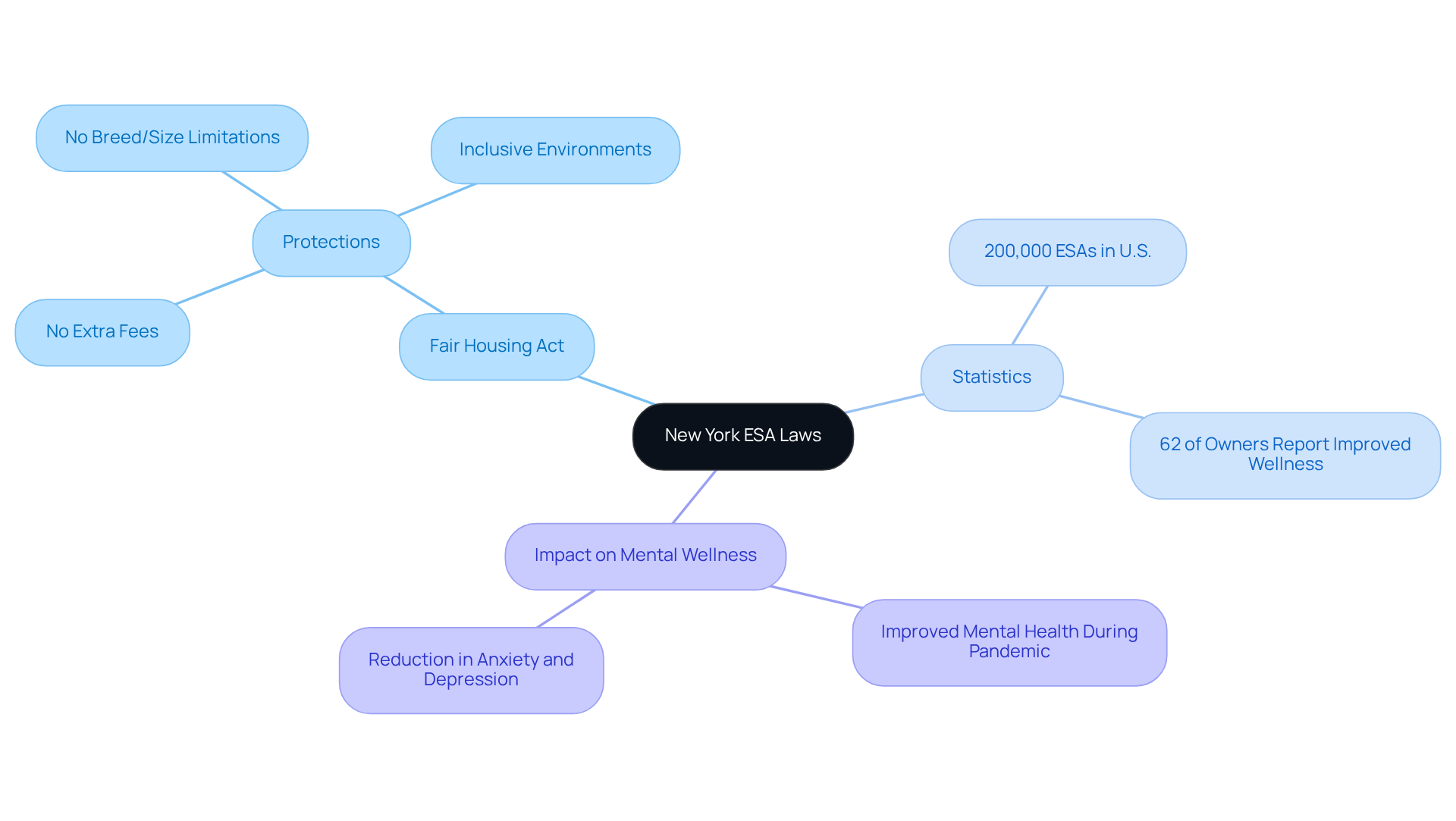
Landlord Rights: What You Need to Know About ESAs in Rentals
In New York, landlords have a legal obligation to accept tenants with a New York emotional support animal, as long as they present a valid letter for these animals. This legal framework ensures that landlords cannot impose pet fees or deposits specifically for ESAs, acknowledging their vital role in supporting individuals facing mental health challenges. However, it is important to note that landlords retain the right to deny requests for a New York emotional support animal if it poses a direct threat to the safety of others or if the tenant is unable to demonstrate a legitimate disability.
Tenant and Landlord Responsibilities:
- Tenants: It is essential for tenants to proactively inform landlords about their ESA needs and to provide the necessary documentation.
- Landlords: Understanding legal obligations is crucial, including the requirement to permit New York emotional support animals in rental properties unless they disrupt safety or well-being.
Effective communication between tenants and landlords plays a pivotal role in preventing misunderstandings. Real estate experts emphasize that clear dialogue can significantly enhance tenant-landlord relationships, ensuring compliance with the Fair Housing Act while respecting the rights of all parties involved.
Recent statistics reveal that a notable percentage of landlords in New York still charge fees for New York emotional support animals, despite legal prohibitions. This situation underscores the ongoing need for education and awareness regarding ESA regulations among property owners. Case studies indicate that successful communication between tenants and landlords often leads to improved compliance with ESA regulations, fostering a more inclusive living environment.
As we look ahead to 2025, the New York emotional support animal rental laws continue to protect tenants, mandating reasonable accommodations for ESAs without imposing additional financial burdens. By staying informed and adhering to these regulations, landlords can cultivate a supportive atmosphere for tenants who require emotional support, all while maintaining the integrity of their properties.
Actionable Tips for Tenants:
- Prepare your ESA documentation before approaching your landlord.
- Schedule a meeting to discuss your ESA needs clearly and respectfully.
- Be ready to describe how your ESA assists in alleviating your mental well-being challenges.
- Follow up in writing to confirm any agreements made during discussions.
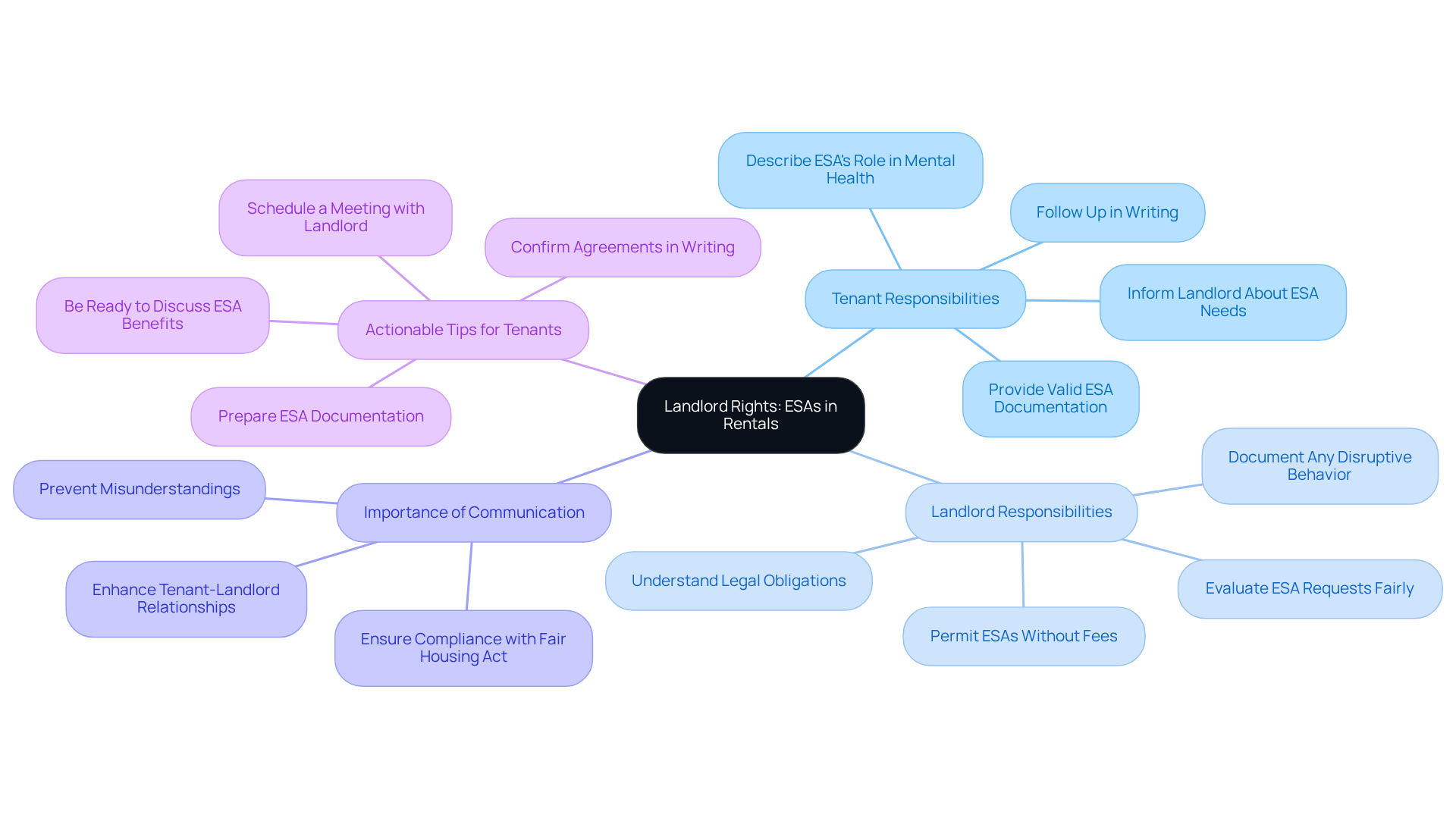
Obtaining an ESA Letter: Steps and Requirements in New York
In New York, the journey to acquiring a New York emotional support animal letter begins with a heartfelt consultation with a licensed mental wellness professional (LMHP). This process typically starts with an online evaluation, designed to assess your unique mental wellness needs, followed by a compassionate telehealth consultation. During this session, the LMHP will thoughtfully evaluate the necessity of an ESA based on your mental state, which may encompass challenges such as anxiety, depression, PTSD, or other qualifying disabilities.
Emotional Support Animals play a vital role in nurturing mental health, alleviating symptoms associated with these conditions, and providing comfort and companionship to those in need. While they are not trained like Service Animals, ESAs are welcomed in university housing and other accommodations, promoting equal opportunities for individuals to fully enjoy their residential lives.
Once your ESA is approved, the letter must be issued on the professional’s official letterhead, complete with their licensing information. This letter is essential for individuals seeking housing and travel arrangements, as it validates the need for an emotional support companion under the Fair Housing Act and Air Carrier Access Act.
Statistics reveal that over 1,000 licensed mental health professionals in New York are ready to provide letters for a New York emotional support animal, reflecting a growing acknowledgment of the therapeutic benefits of pet companionship. Licensed professionals underscore the importance of transparency during the assessment process, stating, “It’s absolutely crucial that you’re transparent and honest about your intentions in this consultation.” They will issue an ESA letter only if they genuinely believe it is ethically warranted, confirming that the emotional support companion truly meets your needs.
Additionally, it’s important to be aware that obtaining an ESA letter typically costs between $150 to $200, a consideration that many working professionals will find significant. Remember, you are not alone in this journey; support is available to help you navigate through these emotional challenges.
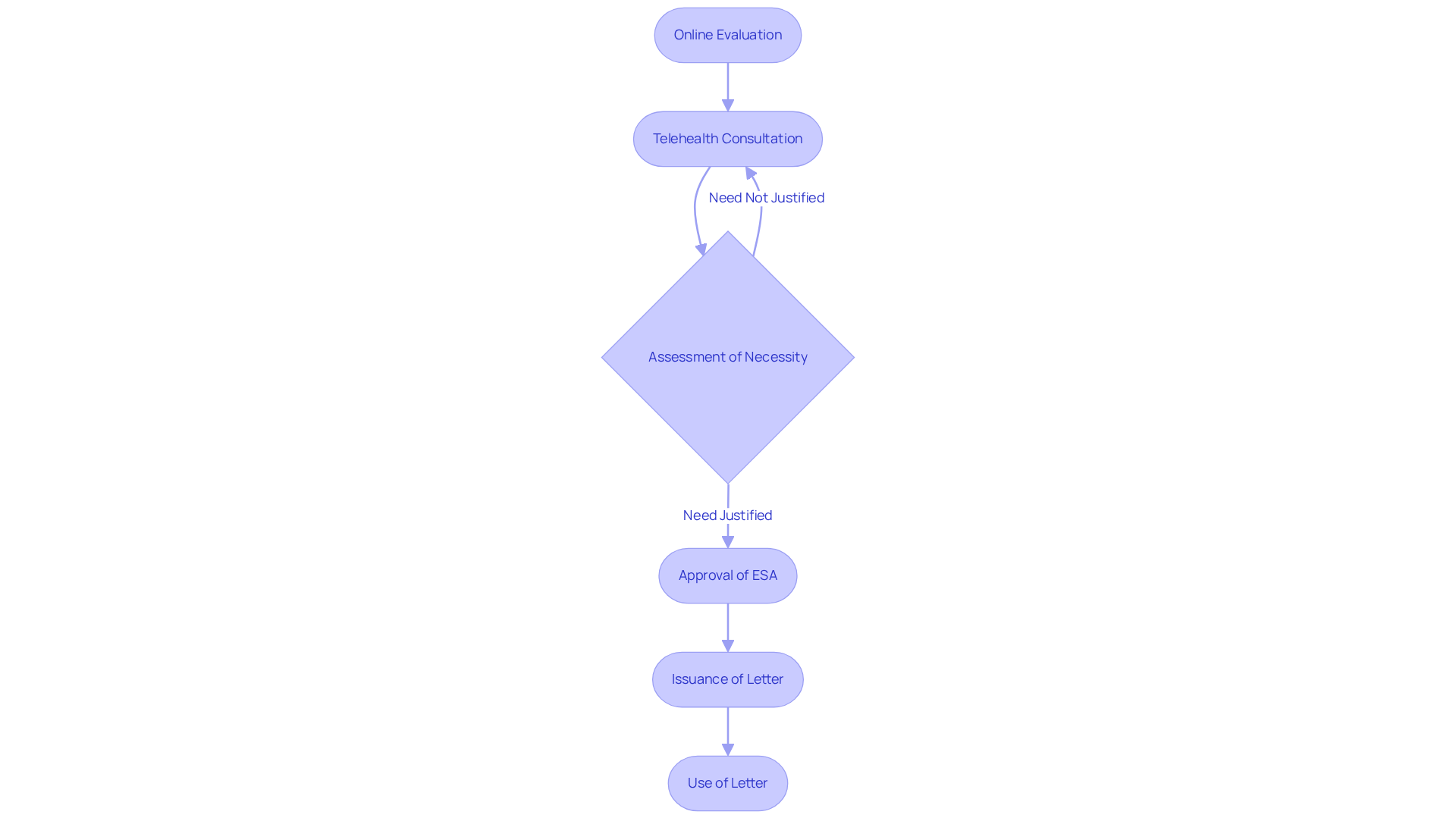
ESA vs. Service Animals: Understanding the Distinctions
Emotional support creatures offer vital comfort and companionship, yet they do not enjoy the same extensive legal rights as service animals. Service creatures, specifically trained to assist individuals with disabilities, benefit from broader access rights under the Americans with Disabilities Act (ADA). This includes entry into public spaces where pets are typically not allowed. Service dogs undergo rigorous training through specialized programs to perform tasks directly related to their handler’s disability, such as guiding individuals with visual impairments or alerting deaf individuals to sounds. Although there is no legal requirement for service dogs to be certified, obtaining certification from recognized organizations can lend credibility and ensure that the service dog meets specific training standards. In contrast, New York emotional support animals are recognized primarily for their emotional assistance and do not have guaranteed access to public spaces unless explicitly allowed by property owners.
In New York, the legal framework distinguishes between these two categories of New York emotional support animals. While service creatures are protected under the ADA, emotional support companions are covered under the Fair Housing Act (FHA) and the Air Carrier Access Act (ACAA), which provide specific protections in housing and air travel. For instance, landlords cannot impose pet fees or deny housing based on ‘no pet’ policies for emotional support animals, as long as the owner possesses the necessary documentation from a licensed mental health professional.
Statistics indicate that 12.6% of service dog owners have encountered extra fees when renting properties due to their service dogs, underscoring the ongoing challenges in public awareness and compliance with these laws. Additionally, a survey revealed that 73.8% of service dog owners have faced unlawful inquiries regarding their disabilities, highlighting the urgent need for increased public awareness about the distinctions between emotional support creatures and service dogs. Businesses hold a responsibility to educate their staff on service dog laws to prevent discrimination. Understanding these differences is crucial for ESA owners to effectively navigate their rights and advocate for their needs.
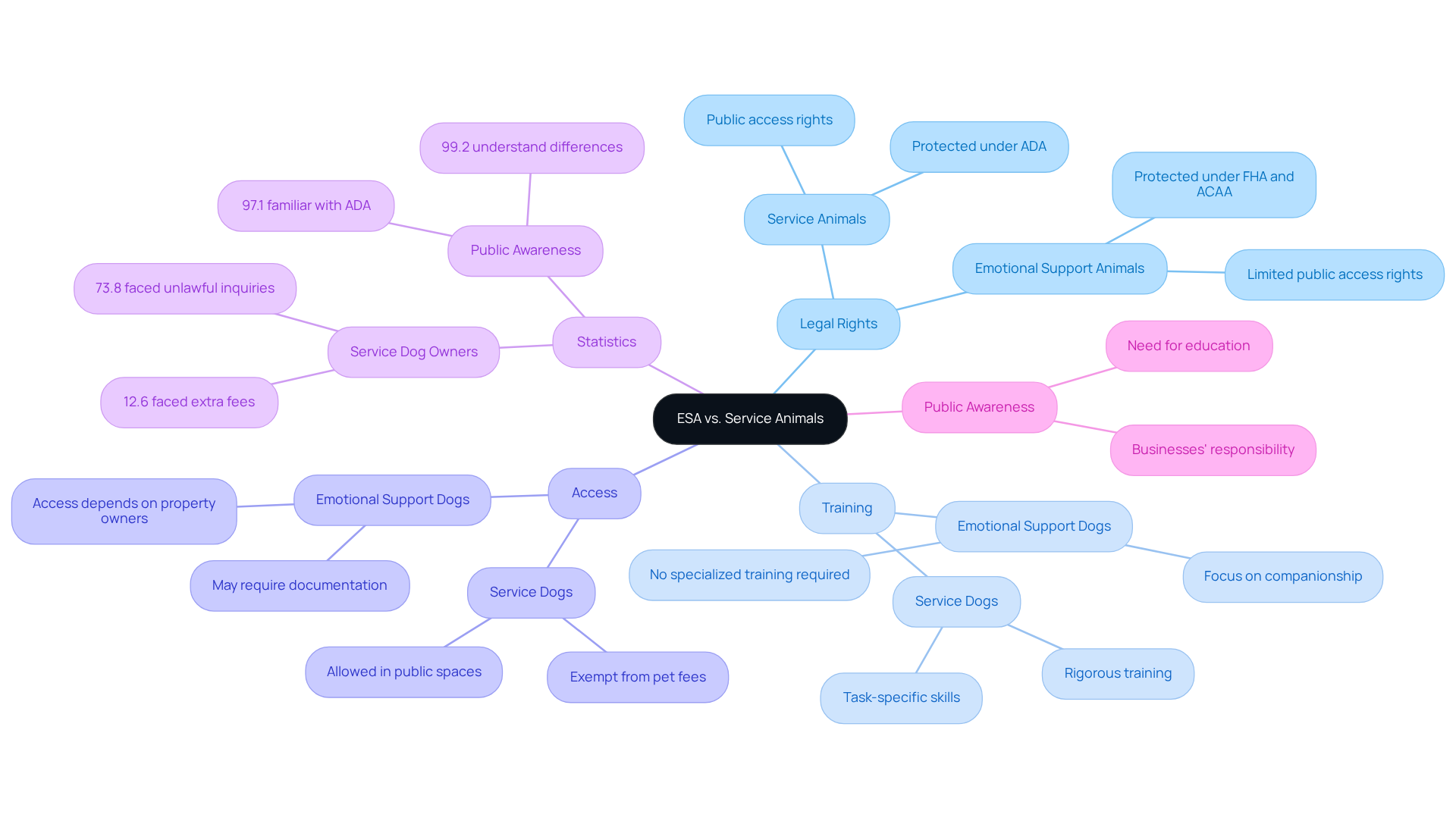
Travel Regulations: Taking Your ESA on Flights and Public Transport
Traveling with a New York emotional support animal (ESA) can be a challenging experience, particularly in light of the changing policies of airlines and public transport providers. As of 2025, most airlines no longer classify emotional support creatures as service beings. This shift often results in the imposition of pet charges and the requirement for specific paperwork. For instance, Air Canada has ceased to recognize emotional support pets, yet psychiatric service dogs can still travel with the appropriate documentation, including a U.S. DOT form and a recommended PSD letter to facilitate a smoother check-in. It’s vital to notify the Medical Assistance Desk at least 48 hours prior to your flight to ensure compliance. Pet fees can vary based on the type of flight, and while there are no breed restrictions for service dogs, snub-nosed breeds may face certain limitations.
Statistics reveal a significant increase in the number of New York emotional support animals being transported, with reports indicating a 57% rise in such companions being carried in jet cabins daily. This surge has led airlines to tighten their policies, raising concerns about the authenticity of ESA credentials. For example, United Airlines has experienced a notable uptick in ESA requests, prompting questions about the legitimacy of some claims.
Public transport regulations also vary widely; while some providers do allow New York emotional support animals, others do not. For instance, VIA Rail mandates that therapy pets must be accompanied by a health certificate and a note from a licensed medical professional. Therefore, it is essential for owners of a New York emotional support animal to verify the specific regulations of their chosen transport provider before embarking on their journey.
Successful travel experiences with emotional support animals often depend on thorough preparation and a clear understanding of these regulations. By ensuring compliance with airline policies, particularly those of Air Canada, and having the necessary documentation ready, ESA owners can navigate the complexities of travel more effortlessly. This proactive approach ultimately enhances their travel experience, offering peace of mind and support during their journey.
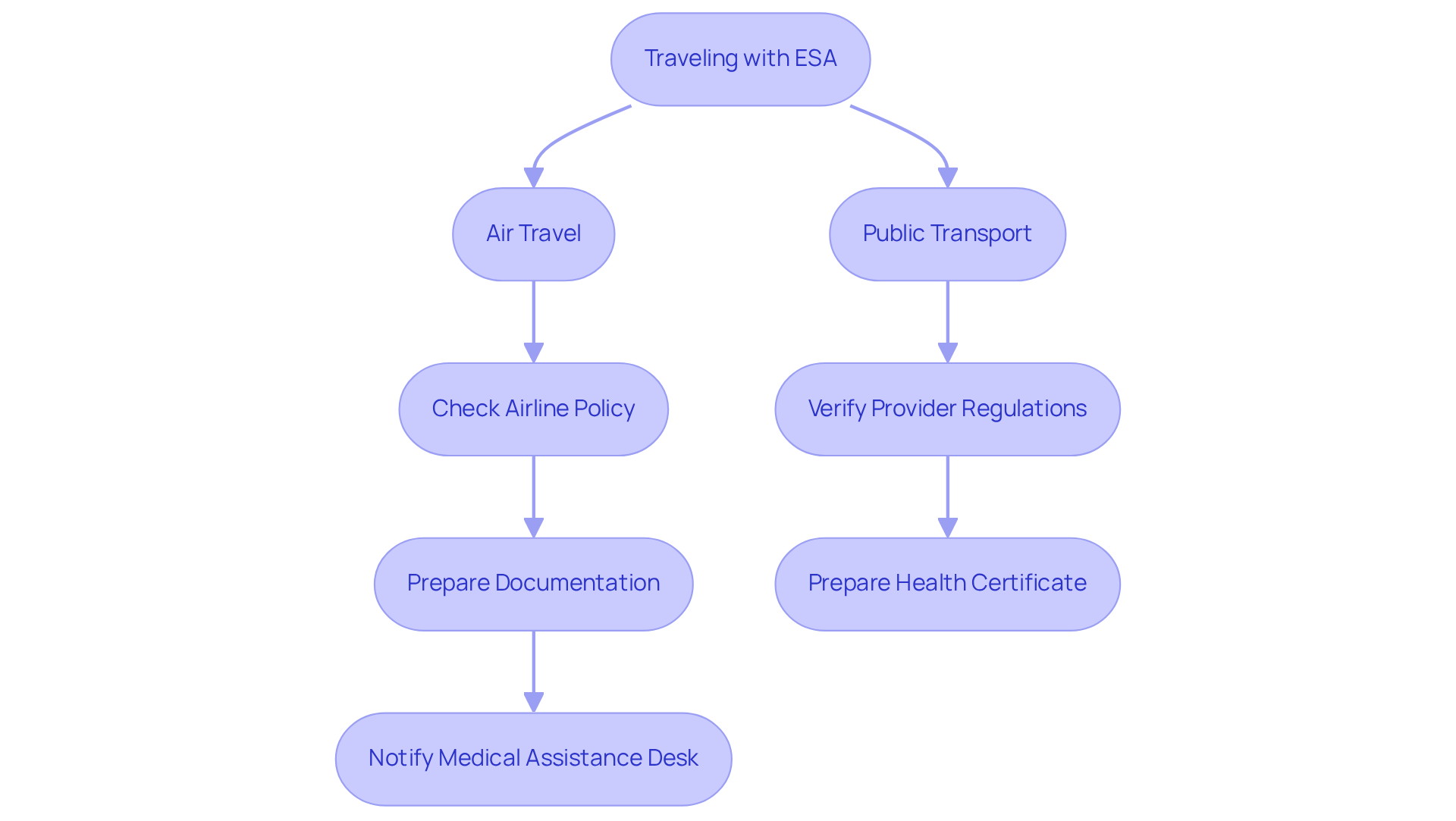
Employment Rights: Navigating ESA Policies in the Workplace
In New York, individuals seeking comfort through a new york emotional support animal face a significant challenge: these animals lack the same legal protections in the workplace as service animals recognized under the Americans with Disabilities Act (ADA). While employers are not required to permit ESAs, it is heartening to know they are encouraged to consider requests for reasonable accommodations. If you wish to bring an ESA to work, presenting documentation from a licensed mental health professional and engaging in an open discussion with your HR department about your specific needs can be a vital step forward.
It’s essential to remember that service dogs do not legally need to be certified or registered; however, obtaining certification can lend credibility and ensure that the service dog has received proper training. Each request for an ESA is assessed on a case-by-case basis, allowing employers the discretion to grant or deny requests based on individual circumstances. This can be a daunting process, but understanding that each situation is unique can help ease the emotional burden.
Statistics reveal that approximately 60% of employers in New York have begun to implement policies regarding new york emotional support animals, reflecting a growing awareness of the benefits these animals offer. Companies that actively support ESAs often see enhanced employee morale and retention rates. For instance, consider the inspiring story of an employee who successfully integrated their ESA into the workplace, leading to improved productivity and reduced stress levels among team members. Such positive outcomes highlight the potential for ESAs to make a meaningful difference in the work environment.
HR professionals emphasize the importance of clear communication and thorough documentation in the accommodation process. They recommend that employees articulate how their ESA assists them in performing their job duties, which can facilitate a smoother approval process. Reasonable accommodations may include allowing the ESA in the workplace, providing designated areas for the pet, or permitting flexible work arrangements to support the employee’s needs.
As we look towards 2025, understanding the evolving landscape of new york emotional support animal rights is crucial for both employees and employers. With the increasing presence of New York emotional support animals, organizations are encouraged to develop comprehensive policies that address these requests while ensuring compliance with applicable laws. This journey towards acceptance and understanding can foster a more inclusive and supportive workplace for everyone.

Public Access Laws: Where ESAs Are Permitted in New York
Emotional support animals (ESAs) do not enjoy the same public access privileges as service animals, which can be a source of frustration for many. In New York, emotional support animals are often prohibited in public spaces such as restaurants, stores, or public transportation unless the property owner explicitly authorizes them. This limitation can be disheartening, highlighting the need for ESA owners to communicate openly with property owners to understand their rights and prevent misunderstandings.
However, it is heartening to note that under the Fair Housing Act, emotional support animals are granted access in housing situations. This provision allows individuals with mental health needs to live alongside their support animals, even in no-pet policies.
As of 2025, it is estimated that only about 20% of public places in New York permit emotional support animals. This statistic underscores the importance of awareness and advocacy for their owners. Experts remind us that while property owners can establish their own policies regarding ESAs, they cannot deny access based on personal biases or unfounded fears.
Grasping these nuances is essential for owners of a New York emotional support animal as they navigate public spaces, and it is crucial to remember that support is available to help them through these challenges.
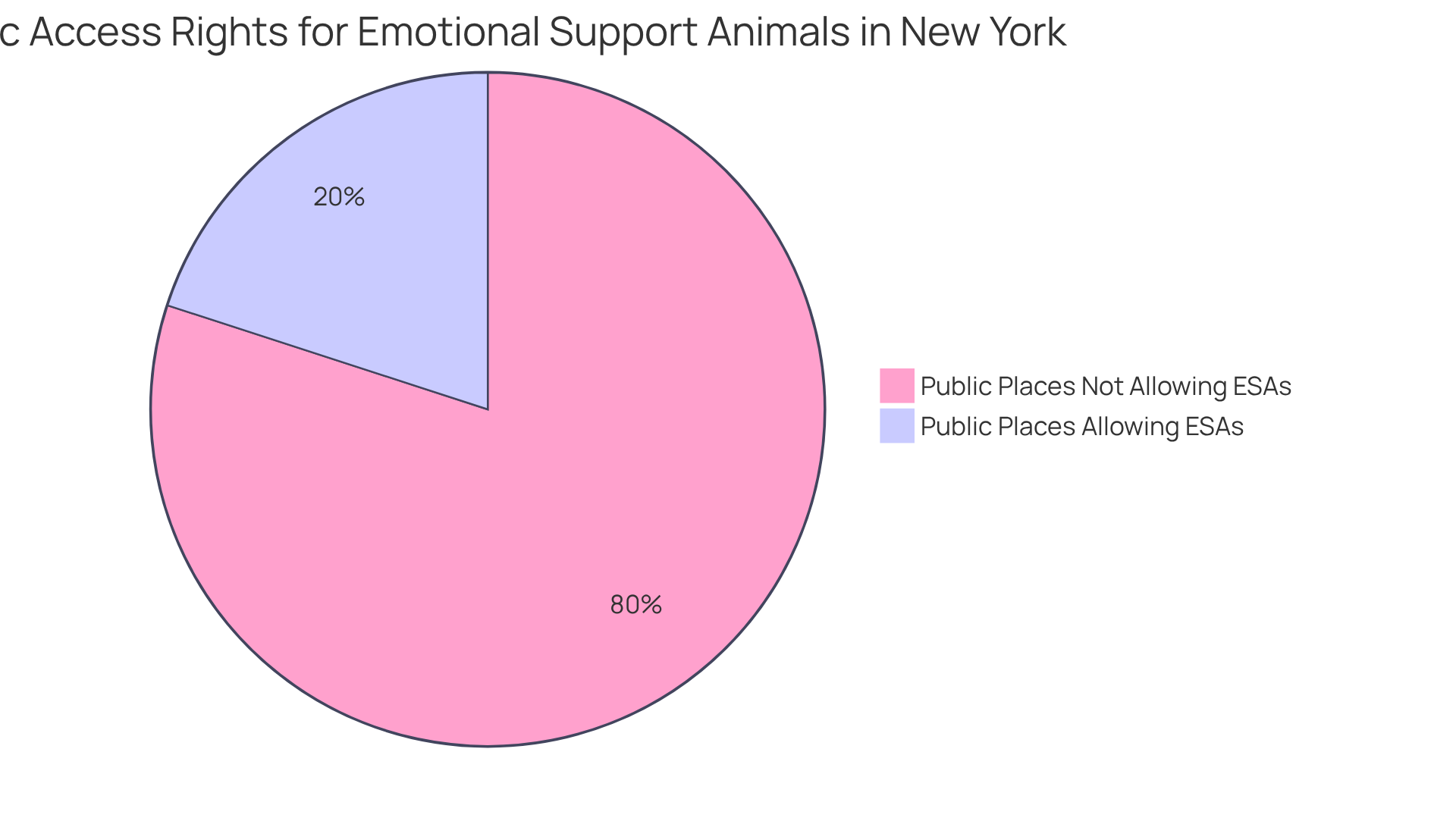
Documentation Requirements: What You Need for Your ESA
To qualify for an Emotional Support Animal (ESA), individuals must obtain a valid ESA letter from a licensed mental wellness expert. This letter should include essential information such as the professional’s licensing details, signature, and a clear declaration confirming the individual’s need for an ESA due to a recognized mental condition. In New York, housing providers often require this documentation to ensure compliance with the Fair Housing Act, which mandates reasonable accommodations for individuals with disabilities.
Moreover, housing providers typically seek additional verification regarding the animal’s vaccinations and wellness status. For ESA owners, keeping this documentation readily accessible is crucial. It not only facilitates smoother interactions with landlords but also reinforces the legitimacy of their request. Did you know that many housing providers routinely verify ESA letters? This highlights the necessity for accurate and comprehensive documentation.
As Robert Clendenin, MD, insightfully notes, ‘The new york emotional support animal has gained acknowledgment as an important companion in New York.’ This statement emphasizes the significance of legitimate ESA letters in addressing mental wellness needs. Such acknowledgment is vital for students and working professionals alike, as it underscores the role of ESAs in alleviating symptoms associated with mental well-being issues.
In summary, a valid ESA letter must clearly express the need for the companion’s presence, include the mental health professional’s credentials, and be prepared to meet any additional requests from housing providers regarding the companion’s health. This proactive approach empowers ESA owners to effectively advocate for their rights and enjoy the therapeutic benefits of their companions while navigating the assistance approval process with ease.
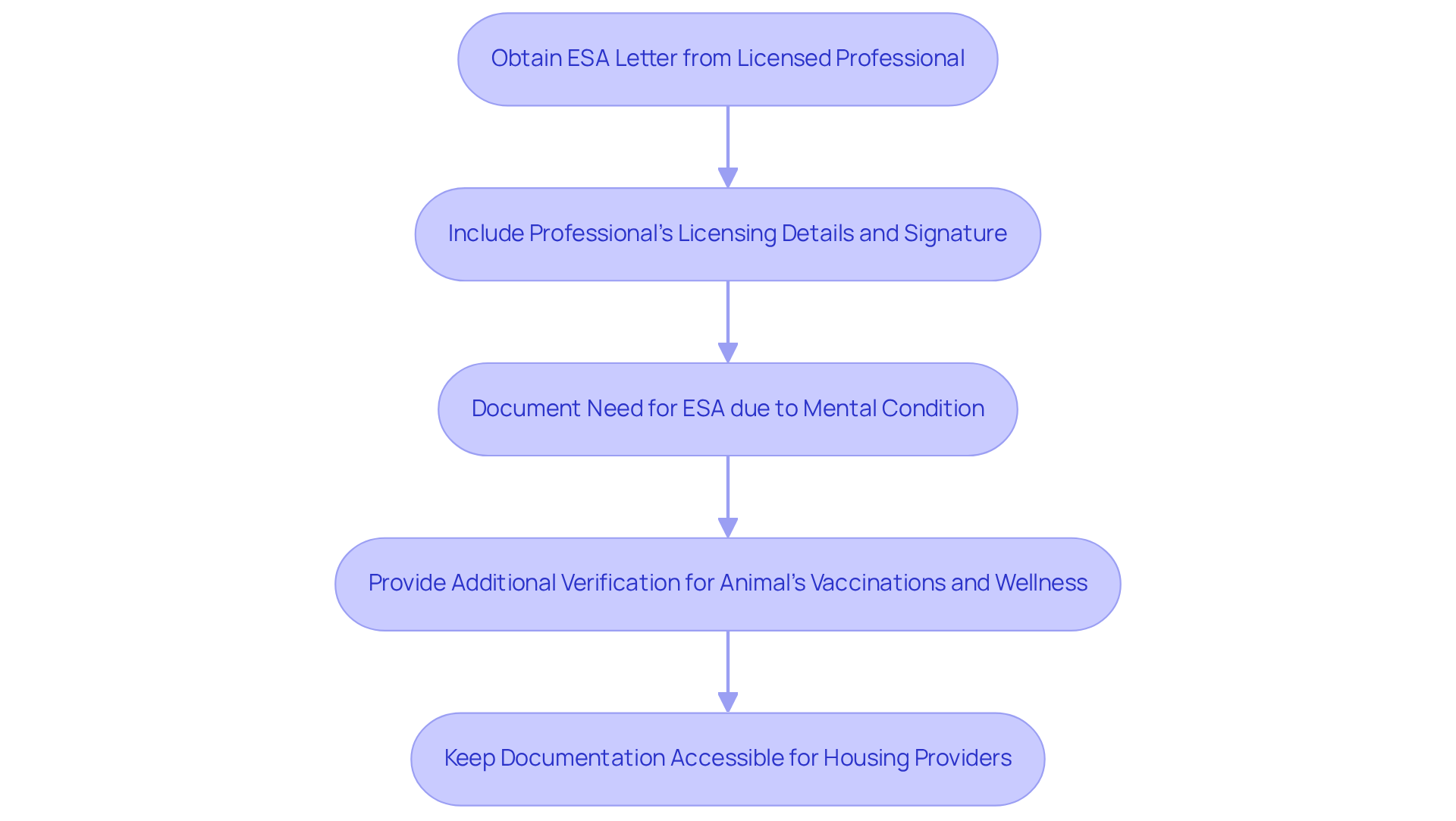
Common Misconceptions: Debunking Myths About Emotional Support Animals
Misconceptions about Emotional Support Animals (ESAs) are prevalent, leading to confusion about their roles and rights. Many individuals mistakenly believe that emotional support entities require specialized training, akin to that of service animals. In truth, emotional support animals do not need to perform specific tasks; their primary purpose is to provide emotional comfort. Additionally, there is a common misconception that emotional support animals enjoy the same access rights as service animals. This is not the case; while service animals are granted broad access under the Americans with Disabilities Act (ADA), emotional support animals have limited legal protections in public spaces.
Public education initiatives play a vital role in dispelling these myths and nurturing a respectful understanding of ESA rights. Recent surveys reveal that a significant number of people still think emotional support animals require special training, underscoring the need for ongoing awareness campaigns. Mental health professionals stress that educating the public about the unique roles of ESAs can help alleviate stigma and foster acceptance. By clarifying these misconceptions, we can better support ESA owners and enhance their quality of life, offering them the understanding and compassion they deserve.
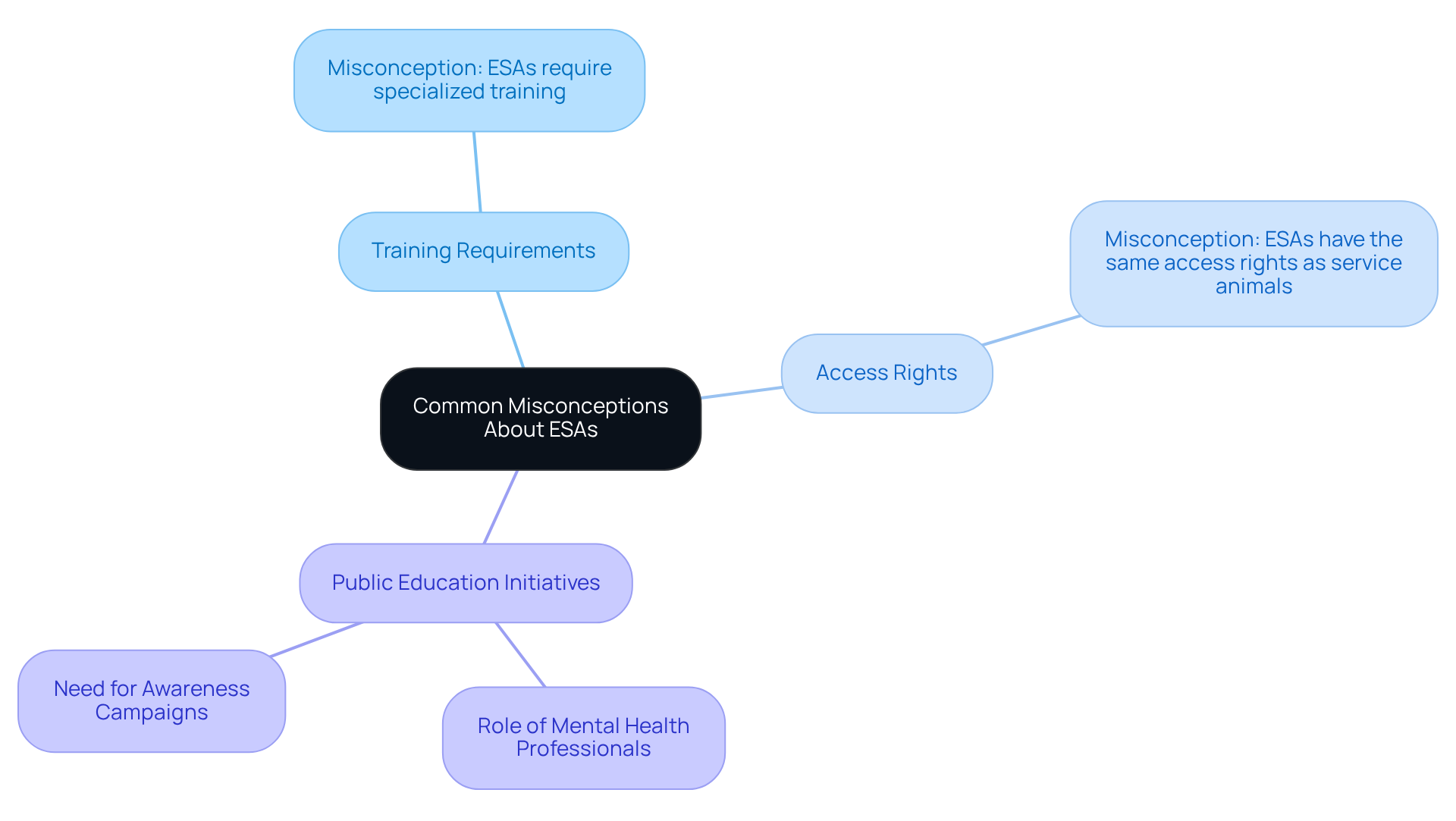
Conclusion
Navigating the laws surrounding emotional support animals (ESAs) in New York can be a daunting journey for individuals seeking the comfort and companionship these animals provide. It is essential to understand the legal protections afforded by the Fair Housing Act and the responsibilities that both tenants and landlords hold. By exploring the processes involved in obtaining an ESA letter and the distinctions between ESAs and service animals, we can see that informed advocacy is vital for ensuring access to these cherished companions.
Many face emotional challenges that can feel overwhelming. The streamlined services offered by Wellness Wag for obtaining ESA letters serve as a supportive solution, helping individuals to secure the companionship they need. However, evolving regulations regarding landlord obligations and the challenges faced when traveling with ESAs can add layers of complexity. It is crucial to foster public awareness to combat misconceptions about ESAs, reinforcing the significance of education in promoting understanding and acceptance.
As the landscape of emotional support animal laws continues to evolve, it is imperative for individuals to remain informed about their rights and the necessary steps to secure support. Advocacy and education play pivotal roles in ensuring that those who rely on emotional support animals receive the understanding and accommodations they need. This support ultimately enhances their mental well-being and quality of life, reminding us all of the profound impact that compassionate companionship can have.
Frequently Asked Questions
What services does Wellness Wag provide for New Yorkers seeking emotional support animals (ESAs)?
Wellness Wag offers a streamlined platform for obtaining letters for New York emotional support animals, including a brief assessment for eligibility and a consultation with licensed medical professionals. Clients can expect their official ESA letter within 24 hours of approval.
How does Wellness Wag ensure customer satisfaction with their ESA letter services?
Wellness Wag provides a 100% money-back guarantee if the ESA letter is not approved, ensuring customer confidence in their services.
What are the payment options available for Wellness Wag’s services?
Wellness Wag offers flexible payment plans starting as low as $32.25, making their services affordable.
What legal protections do emotional support animals have in New York?
In New York, emotional support animals are protected under the Fair Housing Act (FHA), which requires housing providers to allow residents to keep ESAs as a reasonable accommodation for disabilities without imposing extra fees or breed and size limitations.
Can landlords deny requests for emotional support animals in New York?
Yes, landlords can deny requests for a New York emotional support animal if it poses a direct threat to the safety of others or if the tenant cannot demonstrate a legitimate disability.
What responsibilities do tenants and landlords have regarding emotional support animals?
Tenants must inform landlords about their ESA needs and provide the necessary documentation, while landlords are required to allow ESAs unless they disrupt safety or well-being.
What challenges do some tenants face regarding emotional support animal regulations?
Some landlords in New York still charge fees for emotional support animals despite legal prohibitions, highlighting the need for education and awareness about ESA regulations among property owners.
What actionable tips can tenants follow when approaching landlords about their emotional support animals?
Tenants should prepare their ESA documentation, schedule a meeting to discuss their needs clearly and respectfully, describe how their ESA helps with mental well-being, and follow up in writing to confirm any agreements made during discussions.
Certify Your Emotional Support Animal Today

Why You Can Rely on Us?
At Wellness Wag, we believe your pet deserves care rooted in both science and compassion. Each article is carefully researched, written in clear language for pet owners, and then reviewed by qualified professionals to ensure the information is evidence-based, current, and practical for real-life care. Our goal is to help you feel confident in making informed decisions about your pet’s health and well-being.
Reviewed by
Angela Morris, MSW, LCSW
Angela is a licensed clinical social worker with 20 years of experience in patient advocacy and community mental health. She has assisted numerous clients with ESA evaluations and brings a deep understanding of disability accommodations, ensuring that all information is accurate, supportive, and practical.

Written by :
Lena Park
Last Updated :
July 9, 2025












